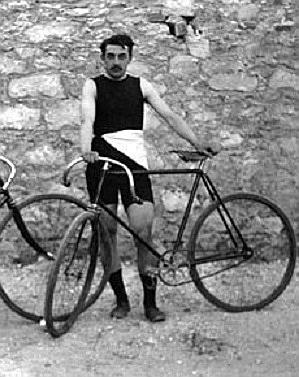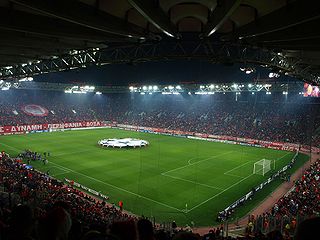Related Research Articles

At the 1896 Summer Olympics, six cycling events were contested at the Neo Phaliron Velodrome. They were organized and prepared by the Sub-Committee for Cycling. Events were held on 8 April, 11 April, 12 April and 13 April 1896. Nineteen cyclists, all men, from five nations competed.

At the 1906 Summer Olympics in Athens, an unofficial football event was held. Only four teams competed, with three of them being clubs from Greece and the Ottoman Empire. Medal tables list the gold medalist as Denmark, with the silver medals given to a mixed team from Smyrna, and the bronze medalists from Thessaloniki listed as Greece. Both were cities in the Ottoman Empire at the time.

Paul Michel Pierre Adrien Masson was a French cyclist who raced at the 1896 Summer Olympics in Athens.

Georgios Paraskevopoulos was a Greek cyclist. He participated in the 1896 Summer Olympics in Athens. Paraskevopoulos competed in the 12 hour race and the road race. According to the data provided by the official website of the Olympic Games, Paraskevopoulos did not finish the 12 hour race and there is no third winner. However, according to the Hellenic Olympic Committee, Paraskevopoulos did finish, and therefore is recognised by HOC as bronze medalist, having completed 940 laps of the Neo Phaliron Velodrome. This is supported by a short article in a Greek newspaper on the following day.

The Neo Phaliron Velodrome was a velodrome and sports arena in the Neo Faliro District of Piraeus, Greece, used for the cycling events at the Athens 1896 Summer Olympics. The property was donated by the Athens-Piraeus train company to the Hellenic Olympic Committee. It became the home of two football clubs which expanded into more sports: Ethnikos Piraeus (1923) and Olympiacos CFP (1925).
F.C. Goudi Athens is a defunct Greek football team of Athens based in homonymous district. It was founded in October 1906 by dissatisfied athletes of the Ethnikos Athens and was a founding member both in 1919 of the Athens-Piraeus Football Clubs Association and in 1926 of the Hellenic Football Federation. It is also referred to as the "Gymnastics Club" when its executives took part in track and field and volleyball games, without, however, particularly developing the specific sports. It permanently suspended its activities during the first post-war period.
Ethnikos Piraeus is a Greek multisport club based in Piraeus. It was founded in 1923. The full name of the club is Ethnikos Omilos Filathlon Pireos/Phalirou or Ethnikos OFPF, which means National Club of Fans of Piraeus and Phalerum. Ethnikos has sections in football, basketball, volleyball, waterpolo, swimming. In most of these sports, Ethnikos has won titles and honours. The most successful department is by far the water polo, which has won many domestic and European titles. Nevertheless, the most popular is the football team, which had a remarkable tradition in the first division in the past.
The derby of the eternal rivals, also called mother of all battles, is a football local derby in the metropolitan area Athens- Piraeus between the most successful clubs of Greece, Olympiacos and Panathinaikos. The rivalry between the clubs and their fans is intense, thus this derby has always been a classic for the Greek capital, as well as the whole of Greece, the most prestigious in the country. The derby is traditionally included among the world's top 10 greatest football derbies by the international media, along with rivalries such as Real Madrid–Barcelona, Liverpool–Manchester United and Boca Juniors–River Plate. American network CNN has ranked the Olympiacos–Panathinaikos derby among the ten greatest football rivalries of all-time. In October 2014, BBC named the Olympiacos–Panathinaikos derby as "Europe's maddest derby" and in September 2019, Daily Mirror ranked the derby of the eternal enemies as the fifth most important derby in the world.
The Greece Football Clubs Association (FCA), founded in 1919 as the Athens-Piraeus FCA, was the first governing body of football in Greece, before the Hellenic Football Federation. Prior to the FCA's founding, football competitions had been organised by the Hellenic Amateur Athletic Association, the Committee of the Olympic Games, or local clubs.

The Georgios Karaiskakis Stadium, commonly referred to as the Karaiskakis Stadium, is a football stadium in Piraeus, Attica, Greece, and the home ground of the Piraeus football club Olympiacos. It is named after Georgios Karaiskakis, a military commander and national hero of the Greek War of Independence, who was mortally wounded in the area.
The 1906 SEGAS Championship was the first organised Hellenic Amateur Athletic Association competition to take place in mainland Greece. It took place in March 1906. It was not organised by the HFF and as such it is not recognised by it.
The 1910–11 SEGAS Championship was the sixth championship organized by SEGAS.
The 1911 SEGAS Championship was the seveth championship organized by SEGAS.
The 1927–28 Panhellenic Championship was the first season of the highest football league of Greece. It was held with the participation of 3 teams, the champions of the founding Associations of the HFF, Athens, Piraeus and Macedonia, in which Atromitos, Ethnikos Piraeus and Aris respectively finished first. At the beginning of the season, the HFF punished Olympiacos and forbade them from taking part in the Piraeus' championship and consequently in the Panhellenic championship. He also forced the other clubs not to play with them even in friendly matches. However, the strong teams of Athens, Panathinaikos, AEK Athens and Apollon Athens, expected financial income from the various tournaments they organized with the participation of Olympiacos. On October 31, 1927, the HFF expelled the illegal clubs and banned them from participating in the championship. As a result, the 3 biggest clubs created a partnership called POK, from the initials of the words: Podosferikós Ómilos Kéntrou or from the initials of the names of the three clubs: "Panathinaikos"-"Olympiacos"-"Konstantinoupόleos". In February 1928, Apollon Athens joined the alliance, with the press calling it "POKA". The non-participation of these clubs weakened the championship, as the fans preferred the international friendlies of the strong clubs and the tournaments that have been established since then during the holidays. The devaluation of the leagues forced the HFF the following July 1928 to revoke their dismissals and from the next season the clubs returned to the leagues normally. Aris eventually won the championship. The point system was: Win: 2 points - Draw: 1 point - Loss: 0 points.
The 1930–31 Panhellenic Championship was the third season of the highest football league of Greece. Olympiacos emerged champion for the 1st time in its history. On the other hand, Apollon Athens, Ethnikos Piraeus and Iraklis qualified for the relegation play-offs for the Athenian, Piraeus' and Macedonian Association, respectively. All three prevailed over their opponents and remained in the national division.
1905-06 was Ethnikos' second season of organised football, competing in the second Panhellenic Championship, in which the club came first.

This article provides details of international football games played by the Greece national football team from their inception in 1929 to 1959.

This is a list of the Denmark national football team results from 1908 to 1929.
At the 1896 Summer Olympics in Athens, an unofficial football event was held on 12 April between two representative teams of Greece and Denmark at the Podilatodromio. The International Olympic Committee (IOC) does not recognize the existence of an official football tournament at the 1896 Olympics and the majority of works devoted to the 1896 Olympic Games do not actually mention a football competition; however, there is incontrovertible evidence that the aforementioned match was played as either a part of the (unofficial) programme, or as a "demonstration sport" during the Olympic Games.
The 1914 SEGAS Championship was the nineth championship organized by SEGAS. It was organized in April 1914 under the name "Panhellenic Football Games".
References
- Empros Newspaper, 12 February 1907 issue (Page 4, Greek)
- Empros Newspaper, 19 February 1907 issue (Page 2, Greek)
- Empros Newspaper, 25 February 1907 issue (Page 2, Greek)